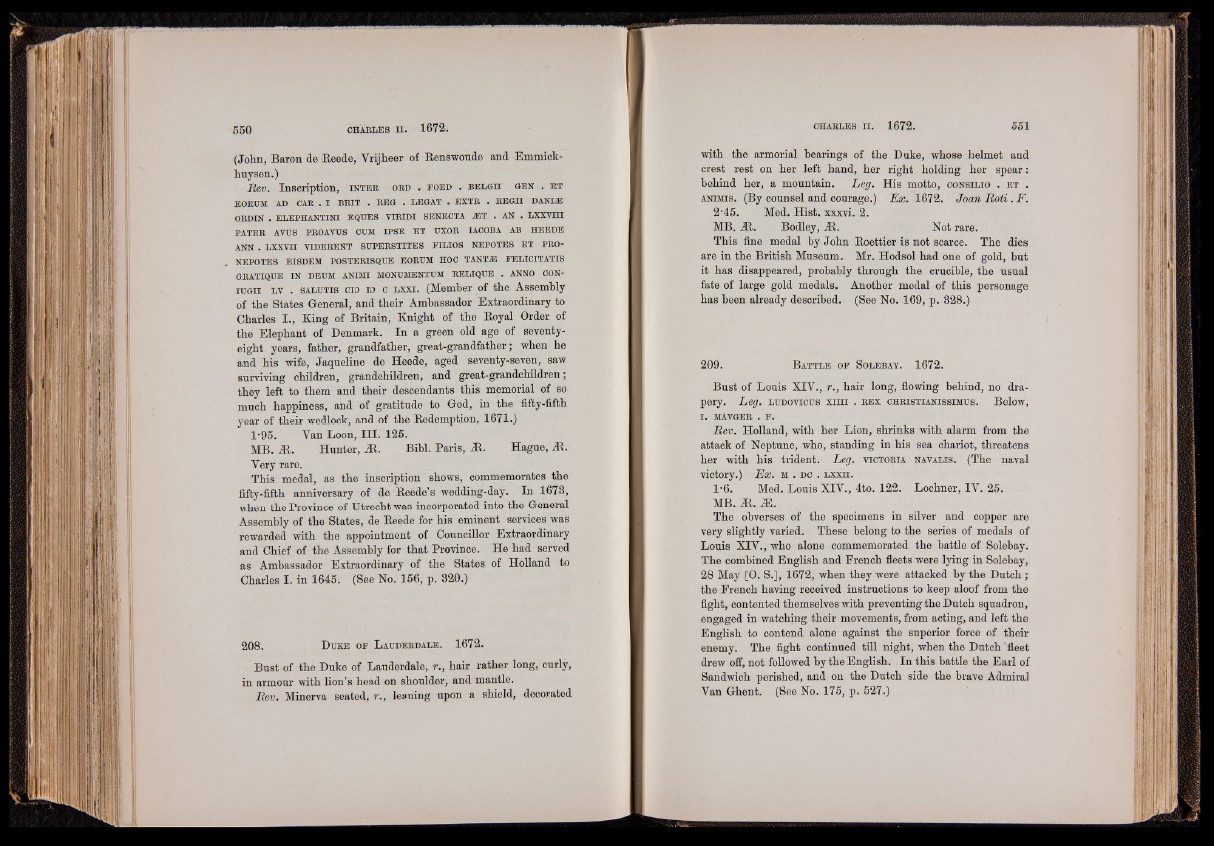
(John, Baron do Reede, Vrijheer of Renswoude and Emmick-
huysen.)
Rev. Inscription, in t e r o rd . f o e d . b e l g i i g e n . e t
EORUM AD CAR . I BRIT . REG . LEGAT . EXTR . REGII DANLffi
ORDIN . ELEPHANTINI EQUES YIRIDI SENECTA AST . AN . LXXVIII
PATER AVUS PROAVIJS CUM IPSE ET UXOR IACOBA AB HEEDE
ANN . LXXVII VIDERENT SUPERSTITES FILIOS NEPOTES ET PRO-
NEPOTES EISDEM POSTERISQUE EORUM HOC TANTJE FELICITATIS
GRATIQUE IN DEUM ANIMI MONUMENTUM RELIQUE . ANNO CONiu
g i i l t . sa l u t is cio io c l x x i . (Member of the Assembly
of the States General, and their Ambassador Extraordinary to
Charles I I King of Britain, Knight of the Royal Order of
the Elephant of Denmark. In a green old age of seventy-
eight years, father, grandfather, great-grandfather; when he
and his wife, Jaqueline de Heede, aged seventy-seven, saw
surviving children, grandchildren, and great-grandchildren
they left to them and their descendants this memorial of so
much happiness, and of gratitude to God, in the fifty-fifth
year of their wedlock, and of the Redemption, 1671.)
l -95. Yan Loon, III. 125.
MB. At. Hunter, At. Bibl. Paris, At. Hague, At.
Very rare.
This medal, as the inscription shows, commemorates the
fifty-fifth anniversary of de Reede’s wedding-day. In 1678,
when the Province of Utrecht was incorporated into the General
Assembly of the States, de Reede for his eminent services was
rewarded with the appointment of Councillor Extraordinary
and Chief of the Assembly for that Province. He had served
as Ambassador Extraordinary of the States of Holland to
Charles I. in 1645. (See No. 156, p. 320.)
208. D u k e o f L a u d e r d a l e . 1672.
Bust of the Duke of Lauderdale, r., hair rather long, curly,
in armour with lion’s head on shoulder, and mantle.
Rev. Minerva seated, r., leaning upon a shield, decorated
with the armorial bearings of the Duke, whose helmet and
crest rest on her left hand, her right holding her spear:
behind her, a mountain. Leg. His motto, c o n s il io . e t .
a n im is . (By counsel and courage.) Ex. 1672. Joan R o ti. F.
2-45. Med. Hist, xxxvi. 2.
MB. At. Bodley, At. Not rare.
This fine medal by John Roettier is not scarce. The dies
are in the British Museum. Mr. Hodsol had one of gold, but
it has disappeared, probably through the crucible, the usual
fate of large gold medals. Another medal of this personage
has been already described. (See No. 169, p. 328.)
209. B a t t l e o f S o l e b a y . 1672.
Bust of Louis XIV., r., hair long, flowing behind, no drapery.
Leg. lu d o v ic u s xim . r e x c h r is t ia n is s im u s . Below,
I . MAVGER . F.
Rev. Holland, with her Lion, shrinks with alarm from the
attack of Neptune, who, standing in his sea chariot, threatens
her with his trident. Leg. v ic to r ia n a v a l is . (The naval
victory.) Ex. m . DC . Lxxn.
1’6. Med. Louis XIV., 4to. 122. Lochner, IV. 25.
MB. At. Æ.
The obverses of the specimens in silver and copper are
very slightly varied. These belong to the series of medals of
Louis XIV., who alone commemorated the battle of Solebay.
The combined English and French fleets were lying in Solebay,
28 May [O. S.], 1672, when they were attacked by the Dutch ;
the French having received instructions to keep aloof from the
fight, contented themselves with preventing the Dutch squadron,
engaged in watching their movements, from acting, and left the
English to contend alone against the superior force of their
enemy. The fight continued till night, when the Dutch ‘fleet
drew off, not followed by the English. In this battle the Earl of
Sandwich perished, and on the Dutch side the brave Admiral
Van Ghent. (See No. 175, p. 527.)